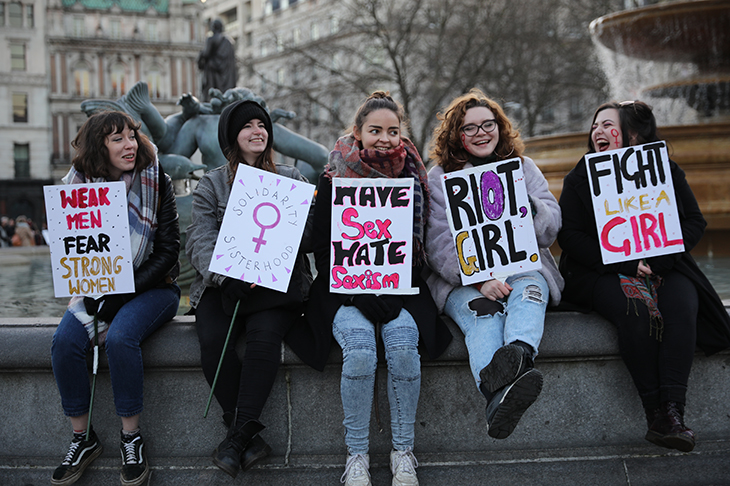You would think that the British Film Institute’s sponsorship of a month-long festival celebrating some of the most memorable female characters in cinema would draw plaudits from feminists. You would be wrong.
Featuring the likes of Nicole Kidman in To Die For, Meryl Streep in Death Becomes Her and Bette Davis in The Little Foxes, the BFI’s programme ‘Playing the Bitch’ is meant to explore the female anti-hero. But in a petition originating with academics at King’s College London, 300 signatories have objected that the festival’s theme ‘uncritically parrots rather than questions the misogynist logics that inform so much Hollywood cinema… The women of Bitches do not subvert gender norms, they inhabit stereotypes’.
With my customarily compulsive counter–factualism, I urge you to conjure the BFI’s parallel-universe festival ‘Playing the Goody Two-Shoes’ — designed to celebrate female characters in cinema who are unfailingly kind, selfless, laudable and chaste. (Perhaps we could screen back-to-back Doris Day movies, culminating in a riveting remake of Gone with the Wind, in which Scarlett relinquishes any claim on Ashley because hitting on other women’s beaux is impolite, and devotes herself to the abolition of slavery.) I envision another petition with at least as many signatures: ‘The Goody Two-Shoes festival uncritically parrots the misogynistic stereotype of all women as passive, pliant, subservient, sexually repressed, two-dimensional, and socialised to be “nice”, at the price of being portrayed as fully human, and thus richly, fascinatingly flawed.’ In other words, you can’t win.
For me, the #MeToo mania has fostered a numbing déjà-vu. We went through the whole Betty Friedan brouhaha in the 1960s of my childhood, Gloria Steinem-ed our way through the 1970s (thanks, Gloria; I still use the title Ms), and — though for some reason we seem to have forgotten all about it — endured a frenetic foofaraw over sexual harassment in the 1990s. Our umbrage unabating, women appear to be running in place.
For let’s take a screen shot of a single day’s worth of New York Times headlines from just this past weekend: ‘Are women taking the cosmic fall for male greed?’ (a con artist is being unfairly singled out for being female). ‘Men invented “likeability”. Guess who benefits’ (voters are mean about female presidential candidates). ‘What “good” dads get away with’ (men aren’t pulling their parental weight). Then there’s the bog-standard ‘The case of a former Harvard professor who was accused of sexual harassment has brought calls for external review’ and, last but not least, ‘How the first female dean of NYU’s engineering school spends her Sundays’. Right now, as for that paper’s female calls to action against rampant sexism, this would qualify as an off day.
I’d be the first to concede that social revolutions overturning centuries of convention don’t happen overnight. For women to attain political and professional parity was bound to take more than one generation. Nevertheless, we do seem to be fighting the same battle over and over again — except that we’re not, quite.
Like many a liberation movement, the fight for women’s equality has steadily suffered from its own success. These many ‘waves’ of feminism roil across an ever more level playing field. Today’s much-deplored ‘gender pay gap’ is overwhelmingly a statistical fix, engineered to seem yawning by comparing carrots and kumquats; in the main, equal pay for equal work is the form. More women than men go to university, while poor white boys sit at the bottom of every variety of league table. It’s not as if the balance of power between the sexes is all perfect, but the scales are roughly evening out, and sometimes they’re tilting unfairly in our direction. Meanwhile, a liberation movement in its senescence — sensibly on the way to the trash heap, having largely achieved its purpose — becomes neurotic, and pathologically petty.
So we have the BFI bending over backwards to commemorate blistering female performances, only to get it in the neck for feting the wrong kind of performance. We have this year’s spectacular outrage that for female runners the T-shirts issued to finishers of the London marathon are ill-fitting. We have the nomination of the one Democratic candidate who has a cracking chance of beating Donald Trump seriously imperilled because a couple of women were ‘uncomfortable’ years ago when Joe Biden seemed a little too chummy, and — shockers — kissed one of them on the back of the head.
This week, too, we have one of America’s most accomplished filmmakers unable to sell his memoir — to any publishing company, for any price — because a mere whiff of a suspicion of sexual misconduct clings to his reputation. Yet his sole accuser, his daughter, was only seven at the time of this ‘inappropriate touching’ that she ‘remembers’. The young woman has been brainwashed by her lunatic mother to detest her father for years, and more than one thorough investigation by the authorities has failed to verify the likelihood of any wrongdoing. But, hey, we gleefully throw Woody Allen and his whole career under the bus, just to be on the safe side. His daughter Dylan, being a woman, must ipso facto be believed.
We’re seeing the same thing happen in relation to race. The more equitable the society grows, the touchier and more prosecutorial the cultural climate. Liberation movements, as they accomplish their objectives, go nuts. There isn’t enough to do, so underemployed activists pick nits. Unfortunately, we’ve never evolved a protocol whereby social justice campaigns, having fundamentally prevailed, call it quits.
A suggestion, then. There’s no paucity of sexism abroad. Little girls married off to old men in Africa get fistulas from underage intercourse and are ostracised because they can’t stop peeing themselves. Girls are still having their clitorises carved out to keep them from enjoying sex too much. Saudi women may finally be able to drive, but they can’t actually go anywhere without a male guardian’s permission. The Taleban still burns down schools to keep girls from getting an education. Turn outward. There’s plenty of genuine injustice out there to go round if you’re gagging for it.
Got something to add? Join the discussion and comment below.
Get 10 issues for just $10
Subscribe to The Spectator Australia today for the next 10 magazine issues, plus full online access, for just $10.
You might disagree with half of it, but you’ll enjoy reading all of it. Try your first month for free, then just $2 a week for the remainder of your first year.














Comments
Don't miss out
Join the conversation with other Spectator Australia readers. Subscribe to leave a comment.
SUBSCRIBEAlready a subscriber? Log in